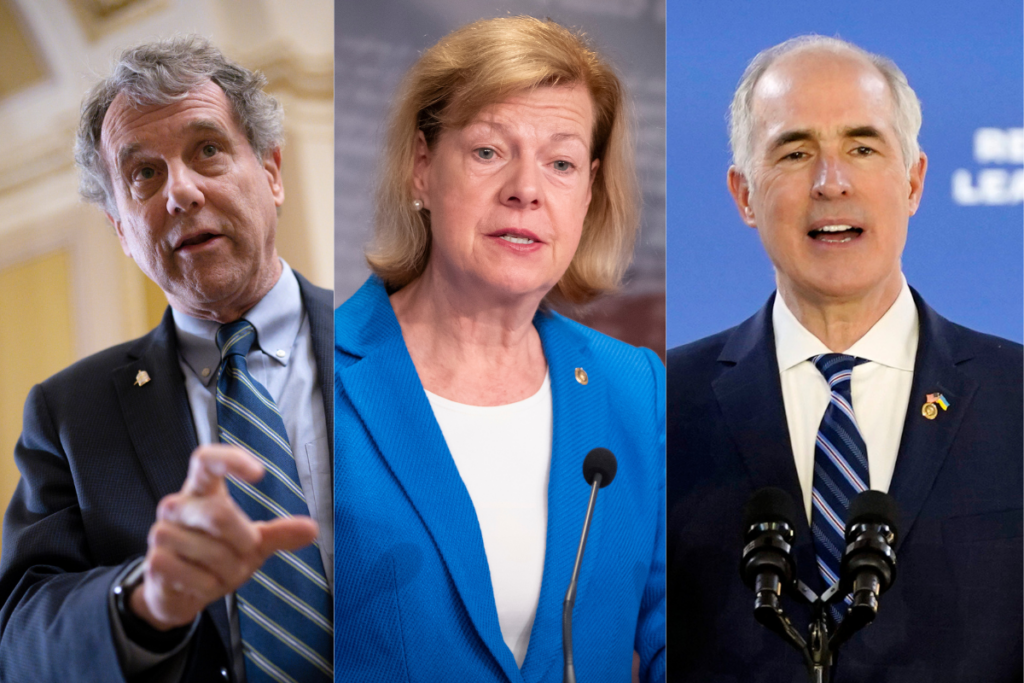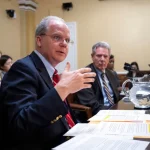
Senate Democrats facing tough reelection challenges in 2024 accept regular checks from the same corporations they have accused of profiting off reducing product sizes, or “shrinkflation,” records show.
In order to combat GOP-led attacks on rising inflation under President Joe Biden, Democrats have sought to cast blame on private companies, which lawmakers, including Sens. Tammy Baldwin (D-WI), Bob Casey (D-PA), and Sherrod Brown (D-OH), say are responsible for package downsizing. Anti-corporate rhetoric hasn’t stopped that trio from taking donations between 2010 and 2024 from boatloads of political action committees tied to corporations, including Coca-Cola, PepsiCo, General Mills, Walmart, Procter & Gamble, and Mondelez International, according to documents on file with the Federal Election Commission.
“It’s a reflection of our broken system of financing campaigns,” Craig Holman, a lobbyist on ethics issues for the left-wing Public Citizen think tank, told the Washington Examiner. “As long as we’re going to allow private interests to fund our congressional and presidential campaigns, conflicts of interests are inevitable.”
News of the cash transfers could place the senators in a tough spot politically and will likely fuel hypocrisy charges from Republicans. The GOP is spending large sums to try to flip their Senate seats, which are toss-ups or leaning Democratic in 2024, according to the nonpartisan Cook Political Report elections tracker.
Spokespeople for Baldwin, Casey, and Brown declined to comment on if the Senate Democrats will either return the corporate money or swear off more in the future. Corporate PAC money has flooded in to boost the lawmakers through their personal campaigns and leadership PACs, which support other candidates, to the tune of hundreds of thousands of dollars.

The lawmakers also pocketed at least $174,300 combined from corporate PACs for Coca-Cola, PepsiCo, General Mills, Walmart, Procter & Gamble, and Mondelez International, as well as executives for most of these companies.
In February, Baldwin, Brown, and Casey put forth the Shrinkflation Prevention Act, a bill the Wisconsin senator said would “crack down on corporations that deceive consumers by selling smaller sizes of their products without lowering the prices.” A press release put out by Baldwin’s office specifically took aim at General Mills, Walmart, Procter & Gamble, and Frito-Lay — a subsidiary of PepsiCo.
“Tammy Baldwin is willing to call out anyone ripping off Wisconsin families whether they sell prescription drugs, insurance, or potato chips. While California bank owner Eric Hovde fights for the wealthy and the well connected, Tammy will continue working to bring down prices for middle class Wisconsin families,” Baldwin campaign spokesman Andrew Mamo, referring to her GOP challenger in 2024, told the Washington Examiner.
Brown, who has touted his efforts fighting “corporate special interests,” called out corporations in a late February Facebook post for “always finding new ways to charge Ohioans more to maximize their profits, like shrinking their products without shrinking their prices.” The post featured images of Doritos, which is produced by Frito-Lay, the popular General Mills cereal Cocoa Puffs, and Gatorade, which is owned by PepsiCo. It also featured Charmin toilet paper, which is owned by Procter & Gamble, and Oreo, the owner of which is Mondelez International.
The Ohio Democrat has raked in tens of thousands of dollars since 2015 from Procter & Gamble, General Mills, and Mondelez International, according to campaign finance disclosures.
“Sherrod will always stand up to greedy corporations trying to rip off Ohio families, which is why he introduced the bill to hold corporations accountable for cutting the size of their products without also cutting their cost,” Reeves Oyster, a spokeswoman for the Brown campaign, told the Washington Examiner.
Casey, on the other hand, published a report in December 2023 called “Shrinkflation: How Corporations Are Shrinking Products To Super-Size Profits.” He sought to fundraise in early March off a post by Sesame Street’s Cookie Monster that said, “Me hate shrinkflation! Me cookies are getting smaller.”
Casey’s 27-page report mentioned Walmart, Procter & Gamble, PepsiCo, and Mondelez International, all of which have cut him checks. Jeffrey Honickman, the CEO of PepsiCo, has given Casey almost $28,000 since 2011 as PepsiCo’s PAC also sent the Pennsylvania Democrat donations.
“Senator Casey is fighting back against big corporations that are ripping off Pennsylvania families. Meanwhile, his opponent David McCormick is siding with greedy corporations to appease the billionaires who are funding his campaign,” Casey campaign spokeswoman Maddy McDaniel said, referring to his 2024 GOP challenger in the Keystone State.
Heading into the 2024 Senate elections, Republicans seek to frame Baldwin, Casey, and Brown as having certain financial conflicts of interest — a narrative that could be bolstered with new reporting on the corporate donations.
CLICK HERE TO READ MORE FROM THE WASHINGTON EXAMINER
Democrats have accused Republicans of being “carpetbaggers” for owning homes outside of states they are running in, though candidates on both sides of the aisle are wealthy and have various properties, the Washington Examiner reported.
“We really need to try and get this private special interest money out of campaign financing altogether,” said Holman, the think tank lobbyist.







